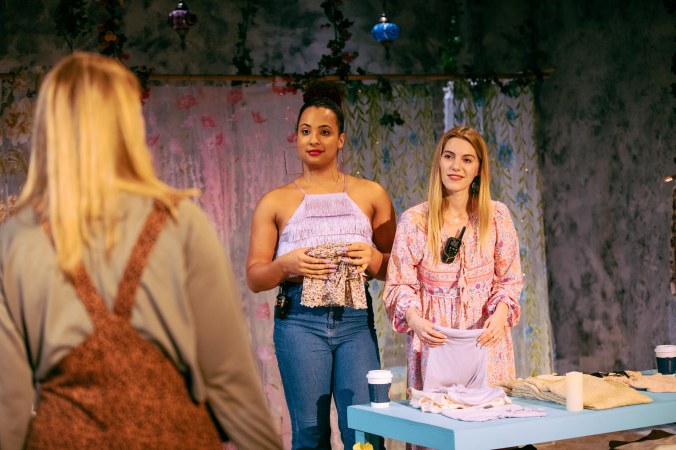
Ianne Fields Stewart and Sabina Friedman-Seitz
Review by Anthony Arcidi
Can women be universally supportive of other women in the mold of Ann Friedman, and eschew any female on female criticism whether it be slut-shaming or beauty bashing? This is the question playwright Lily Houghton attempts to answer in a most allegorical way.
The set is the basement of a trendy woman’s clothing franchise in New York City and becomes a womb-like bunker of sorts in which the workers, three white and one non-white women, form a bond that extends well beyond a clique of co-workers into a family unit with the comforts of tea, latte, glitter, candles and lipstick.
The imagery of seasons of the year and flowers that bloom are emblematic of the phases of the circular union. It opens pre-Spring in which Bluebell (Ianne Fields Stewart), Sweet Pea (Sabina Friedman-Seitz), Bleeding Heart (Carolyn Kettig), welcome Pumpkin (Kirsten Harvey) to the basement team. The banter between them can be overly sycophantic to caustically and privately insulting customers or mocking their boss Janet, played by Star Kirkland, over their headphones, and even switching to long dreamy floral romantic monologues.
The after hours get-togethers among their crew serves partly as a party, with weed and wine, to part ritual practice that becomes a fashion inspired incantation, to a confessional, to sharing session. Mini crises can be decided among them but usually deferring to Bluebell the non white leader of the circle. It’s possible this may be an updated play on the Aunt Jemima nurturing paradigm in which the oppressors are male dominance and abuse.
She engenders a familial and protected feeling among them in which they profess their commitment and love to one another and reveal their inner feelings to each other. It becomes a cozy emotionally intimate gathering that treats the outer world of messy relationships, sex and male dominance like an apocalyptic wasteland outside the store’s basement. Healing of negative body image residue and pursuit of sexual conquest without love is encouraged, if not demanded, as their right to pursue. It is their Eden.
The cheer of spring and summer yield to the cold winds of fall and winter as cracks begin to develop in the special enclave. Someone has stolen two pink thongs and suspicion and intrigue rattles their trust. The mood of the next after-hours goes from chatty to revelatory to accusatory to defensive in quick fashion. The answer of who and why will test the bonds and tenets that had been espoused earlier. This leads to the ultimate dividers of social engagement, economic entitlement and racial inequality, to blister any sense of cohesion and ultimately the groups existence.
The casting choice of a transgender woman as Bluebell adds another dimension to what the play’s author may have intended. The issue of transgender identity and inclusion with feminist solidarity can add another layer to any of the play’s dialogue. Sometimes it’s an awkward fit.
Of the Woman offers a glimpse into the mechanisms of how female relationships hold together, replete with the co-dependencies and need for mutual support in addressing their own healing and affirmation. It’s an environmental experiment with its own premise, potential and results to give so much to mull on about female social dynamics that make this play both a fascinating and challenging experience to take in and think about.
Of the Woman came the beginning of sin, and through her we all die.
Normal Ace’s Medicine show theater 549 W 52nd street, New York City. Running time 90 minutes no intermission
October 3 to 20